Lagos, Peckham, Repeat: a layering of place & people
An exhibition at the South London Gallery considers the relationship between Peckham & Lagos, the capital of Nigeria. In a part of London populated by many Nigerian diaspora who have created lives, families, homes & culture in the gallery’s neighbourhood, Veronica Simpson explores how artists have considered the layering of places & memories.
To be
born in one hemisphere and transported to a radically different one can be a
shock from which one never completely recovers, regardless of how smooth or
difficult the transition. There remains an eternal sense of dis-location, a
vivid imprint of other landscapes, colours, light, and atmospheres that stay
with you, even as you layer over it ever more disparate, later impressions.
I know something of this. For all the ease with which I – a white, British woman – now move through my London surroundings, when I was four I experienced Britain as wholly alien. I had been transplanted, with my family, from Northumberland to India at the age of one, returning with them three years later. The imprint on my infant mind, at its most impressionable stage of awakening consciousness, of Indian clothes, spices, flowers, scents, was deep. It took me years, to the other side of adolescence, before I realised that my perception of my UK surroundings as irredeemably dull – all greys, blacks, beige, and browns – came from the contrast I carried in me of the alternative: a kaleidoscope of sensory extremes, from jewel bright saris to drenching monsoons and the wonder of elephants. No surprise England paled in comparison.
I like to think this sense of ‘dis-location’ has facilitated my ability to view the world through alternative perspectives as a writer and critic. It was easy for me to see the positives, however: to the Brits around me, I slotted right in. But that wasn’t the case for the thousands of Nigerians who travelled to the UK to escape political and civil unrest in Nigeria in the 1970s through to the 1990s – that sense of easy assimilation has never been a given. Except, perhaps, in Peckham. Peckham has probably the largest concentration of Nigerian residents and their descendants in the UK; certainly, it’s the largest in the borough of Southwark, which has 12,000 in total. And over the decades of settling here, raising kids, starting businesses, the community has left a huge imprint in the city – in its shops, bars, restaurants, and the visual language of the streets around the South London Gallery (SLG). Which makes it the perfect site for this investigation into the links between Peckham and the Nigerian capital city of Lagos.
![]()
![]()
The articulation of dis-location – a layering of impressions from vastly different places, whether conflicting or confluent – is particularly nicely evoked at the exhibition’s entrance with two works: Emeka Ogboh’s Lagos Soundscapes (2023), and Ndidi Dike’s Deciphering Value: Economic Anomalies and Unequal Dependencies in Global Commodity Trade (2023). Ogboh has sampled the freestyle rapping of Lagos bus conductors as they traverse the city, weaving snippets of this verbal mapping in with the hustle of the streets. The work is dual-located, placed outside the SLG as well as inside. Outside it becomes a collage with the loud road traffic that ploughs up and down the Peckham Road.
Dike’s installation comprises a tall circular structure made of photographic prints on acetate, weaving familiar Peckham shopfronts of Rye Lane in with the Balogun, Ladipo, Katangua, and Yaba markets in Lagos, with images meshing and mixing as you move around it. Co-curator Folakunie Oshun’s essay in the SLG handout explains that there’s much more to it than that.
The founder and director of Lagos Biennial, Oshun writes: “Before there was a migrant community in Peckham … there was the Royal Niger Company, a British company extracting and trading valuable palm oil and timber in the territory that is now … known as Nigeria. The Royal Niger Company, previously called the National African Company, sold its stakes to the British government in 1899 … This company would later rebrand and return as Lever Brothers, now Unilever, to trade in household products and undertake construction projects in Nigeria and West Africa.” As a reference to the global brands who have profited from their African plunder, Dike has thrown an assortment of consumer desirables and logos into the centre of his sculpture.
![]()
![]()
Dis-location is also the theme of Yinka Shonibare’s two photographs which flank the main gallery’s entrance, both from the series Diary of a Victorian Dandy (1998), in which the artist inserts himself as just another ornately dressed 19th century aristocrat in a gathering of toffs – except he’s the only black one. Inspired by William Hogarth’s class caricatures, what stands out is the supreme confidence in Shonibare’s face and stance, and the way he’s positioned himself at the centre of the action – rather than subserviently on the fringes, where Victorian society portraits preferred to show those of a different class or colour.
There is further dis-location, or duality, evoked in the tall sculpture at the end of the gallery by Victor Ehikhamenor. Cathedral of the Mind (2023) is, at first approach, an ornate and sparkling edifice of pale, mass-produced rosary beads, albeit with more vibrant colours, used to depict a church-style door and windows, It speaks of the importance of both Western religion (the most devout church-goers in Peckham are from Nigerian and Ghanaian Christian communities) and more ancient Nigerian spirituality. On the inside curve of this sculpture is a wholly different, more African representation with the colours of the beads transformed to a rush-like sepia, and two benches of offerings in the form of carved wooden Yoruba twin statues. The twin, in the Yoruban faith, is a mark of divine forces bringing abundance to a house. There is something intriguing being conveyed here about the tools of colonisation through Western religion, deployed as a pathway to assimilation, though also a sense of older, dearly held beliefs continuing to support communities and individuals.
![]()
![]()
Over the road in the SLG’s second building, a former fire station, there are three more floors of works, my favourite being a delicious dis-location – or potent co-location – being enacted in Adeyemi Michael’s film Entitled (2018). An elaborately dressed Nigerian woman rides down Peckham’s Rye Lane, on a beautiful black horse. She must be the first woman to ride down the local high street on horseback in over 100 years – surely the first black woman ever.
She parades serenely past the colourful, graffiti-strewn shop shutters, the chaotic jumble of produce and signages. It’s a glorious image. Apparently, the rider is the artist’s mother in her ceremonial Yoruba attire, and she rides she intones snippets of how she has made her home here, including triumphs and contributions to the community.
I loved this work on first viewing. On second viewing, I liked it more, as I noticed the looks on peoples’ faces as she passes by – delight, amusement, awe. In the gallery, Michael has recreated her own living room. Two armchairs, a table filled with refreshments, and an assortment of glamorous accessories, help the viewer make themselves at home.
![]()
![]()
The power of her presence in this tableau contrasts nicely with the absences in the film showing in the adjacent room. Onyeka Igwe’s No Archive Can Restore You (2020) is a poignant work, shot in the now abandoned and near derelict building of the Nigerian Film Unit – one of the first outposts of the Colonial Film Unit, part of the British Government’s colonial education and propaganda programme. Abandoned since independence, the rooms are filled with dust, cobwebs, clumps of plaster, rusting pipes and – most hauntingly – stacks upon stacks of dusty film reels. The crackly soundtrack offers snippets from the archive.
There is a lovely scope and breadth of work, exploring connection and disconnection, emotional, cultural, social, and geographic. There is much in it that I recognise as someone who lived in Peckham for 25 years, as well as insights and new perceptions. And there is much in here for Peckham’s Nigerian diaspora, as evidenced on both my visits, by the crowds of visitors more diverse than in most London galleries, especially on the Family Day I happened across, featuring Nigerian music and art workshops. The place was jumping, full of sound and conversation – it felt like a gallery takeover, equal parts Lagos and Peckham.
It’s so fashionable right now for galleries to be ticking boxes with all the right issues – gender and race equality, planetary crisis – and often much of it feels tokenistic, no doubt likely to be swept aside when the next issue becomes hotter. But Lagos, Peckham, Repeat speaks with confidence about its locality, thanks to decades long investments in community education and engagement – and the South London Gallery has sacrificed none of its reputation for showcasing cutting edge art in the process.
![]()
![]()
I know something of this. For all the ease with which I – a white, British woman – now move through my London surroundings, when I was four I experienced Britain as wholly alien. I had been transplanted, with my family, from Northumberland to India at the age of one, returning with them three years later. The imprint on my infant mind, at its most impressionable stage of awakening consciousness, of Indian clothes, spices, flowers, scents, was deep. It took me years, to the other side of adolescence, before I realised that my perception of my UK surroundings as irredeemably dull – all greys, blacks, beige, and browns – came from the contrast I carried in me of the alternative: a kaleidoscope of sensory extremes, from jewel bright saris to drenching monsoons and the wonder of elephants. No surprise England paled in comparison.
I like to think this sense of ‘dis-location’ has facilitated my ability to view the world through alternative perspectives as a writer and critic. It was easy for me to see the positives, however: to the Brits around me, I slotted right in. But that wasn’t the case for the thousands of Nigerians who travelled to the UK to escape political and civil unrest in Nigeria in the 1970s through to the 1990s – that sense of easy assimilation has never been a given. Except, perhaps, in Peckham. Peckham has probably the largest concentration of Nigerian residents and their descendants in the UK; certainly, it’s the largest in the borough of Southwark, which has 12,000 in total. And over the decades of settling here, raising kids, starting businesses, the community has left a huge imprint in the city – in its shops, bars, restaurants, and the visual language of the streets around the South London Gallery (SLG). Which makes it the perfect site for this investigation into the links between Peckham and the Nigerian capital city of Lagos.


The articulation of dis-location – a layering of impressions from vastly different places, whether conflicting or confluent – is particularly nicely evoked at the exhibition’s entrance with two works: Emeka Ogboh’s Lagos Soundscapes (2023), and Ndidi Dike’s Deciphering Value: Economic Anomalies and Unequal Dependencies in Global Commodity Trade (2023). Ogboh has sampled the freestyle rapping of Lagos bus conductors as they traverse the city, weaving snippets of this verbal mapping in with the hustle of the streets. The work is dual-located, placed outside the SLG as well as inside. Outside it becomes a collage with the loud road traffic that ploughs up and down the Peckham Road.
Dike’s installation comprises a tall circular structure made of photographic prints on acetate, weaving familiar Peckham shopfronts of Rye Lane in with the Balogun, Ladipo, Katangua, and Yaba markets in Lagos, with images meshing and mixing as you move around it. Co-curator Folakunie Oshun’s essay in the SLG handout explains that there’s much more to it than that.
The founder and director of Lagos Biennial, Oshun writes: “Before there was a migrant community in Peckham … there was the Royal Niger Company, a British company extracting and trading valuable palm oil and timber in the territory that is now … known as Nigeria. The Royal Niger Company, previously called the National African Company, sold its stakes to the British government in 1899 … This company would later rebrand and return as Lever Brothers, now Unilever, to trade in household products and undertake construction projects in Nigeria and West Africa.” As a reference to the global brands who have profited from their African plunder, Dike has thrown an assortment of consumer desirables and logos into the centre of his sculpture.
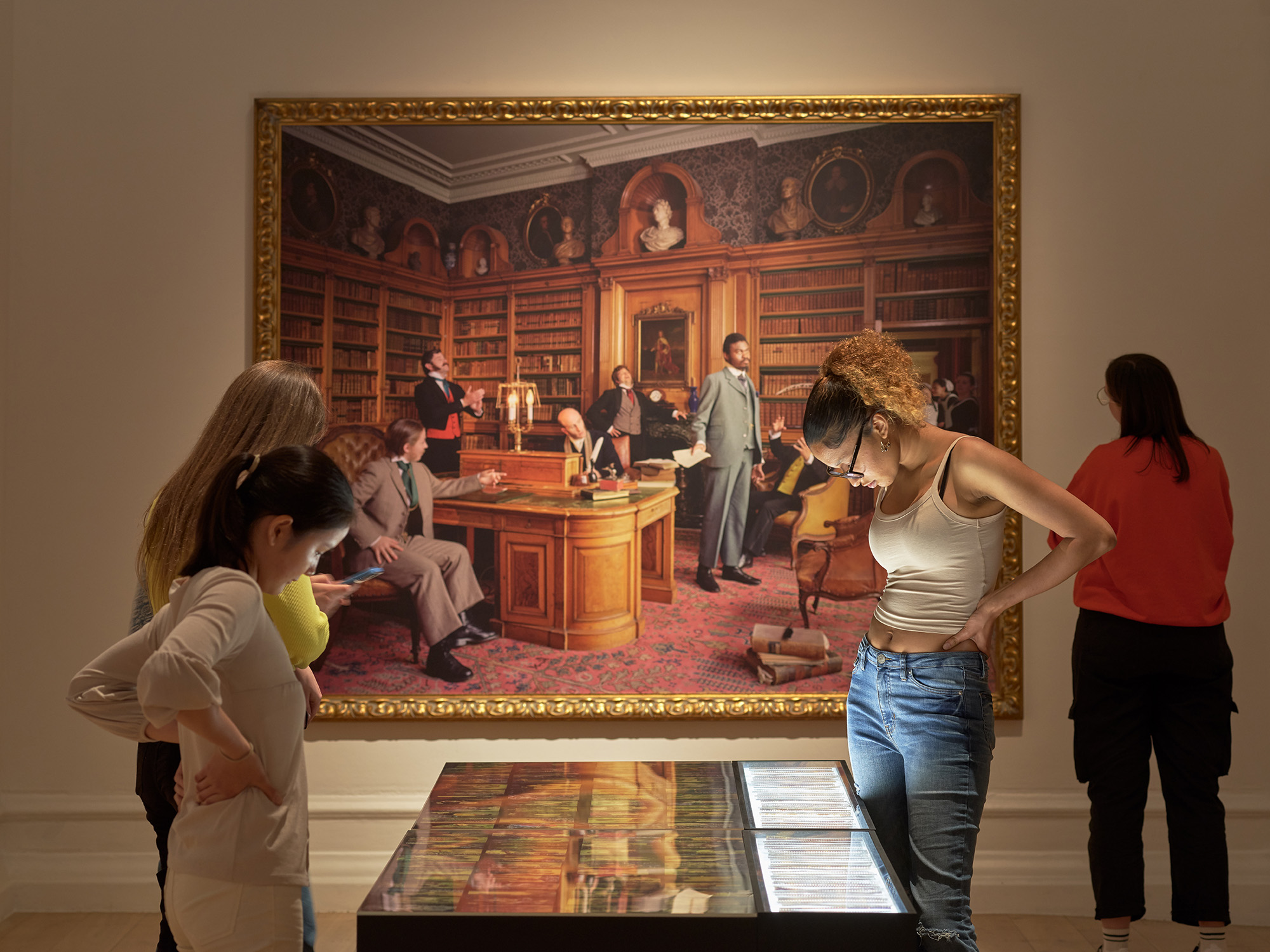

Dis-location is also the theme of Yinka Shonibare’s two photographs which flank the main gallery’s entrance, both from the series Diary of a Victorian Dandy (1998), in which the artist inserts himself as just another ornately dressed 19th century aristocrat in a gathering of toffs – except he’s the only black one. Inspired by William Hogarth’s class caricatures, what stands out is the supreme confidence in Shonibare’s face and stance, and the way he’s positioned himself at the centre of the action – rather than subserviently on the fringes, where Victorian society portraits preferred to show those of a different class or colour.
There is further dis-location, or duality, evoked in the tall sculpture at the end of the gallery by Victor Ehikhamenor. Cathedral of the Mind (2023) is, at first approach, an ornate and sparkling edifice of pale, mass-produced rosary beads, albeit with more vibrant colours, used to depict a church-style door and windows, It speaks of the importance of both Western religion (the most devout church-goers in Peckham are from Nigerian and Ghanaian Christian communities) and more ancient Nigerian spirituality. On the inside curve of this sculpture is a wholly different, more African representation with the colours of the beads transformed to a rush-like sepia, and two benches of offerings in the form of carved wooden Yoruba twin statues. The twin, in the Yoruban faith, is a mark of divine forces bringing abundance to a house. There is something intriguing being conveyed here about the tools of colonisation through Western religion, deployed as a pathway to assimilation, though also a sense of older, dearly held beliefs continuing to support communities and individuals.
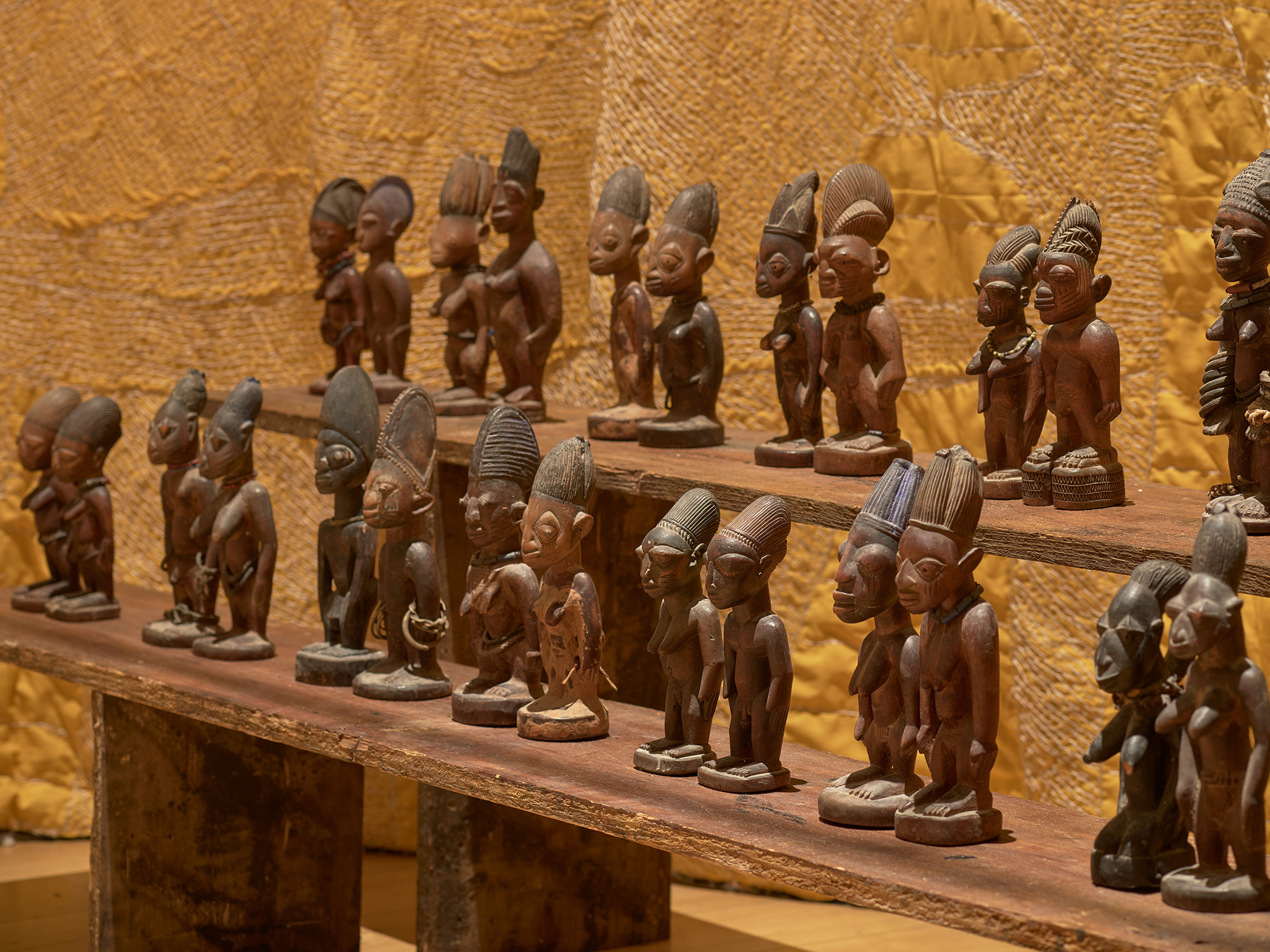
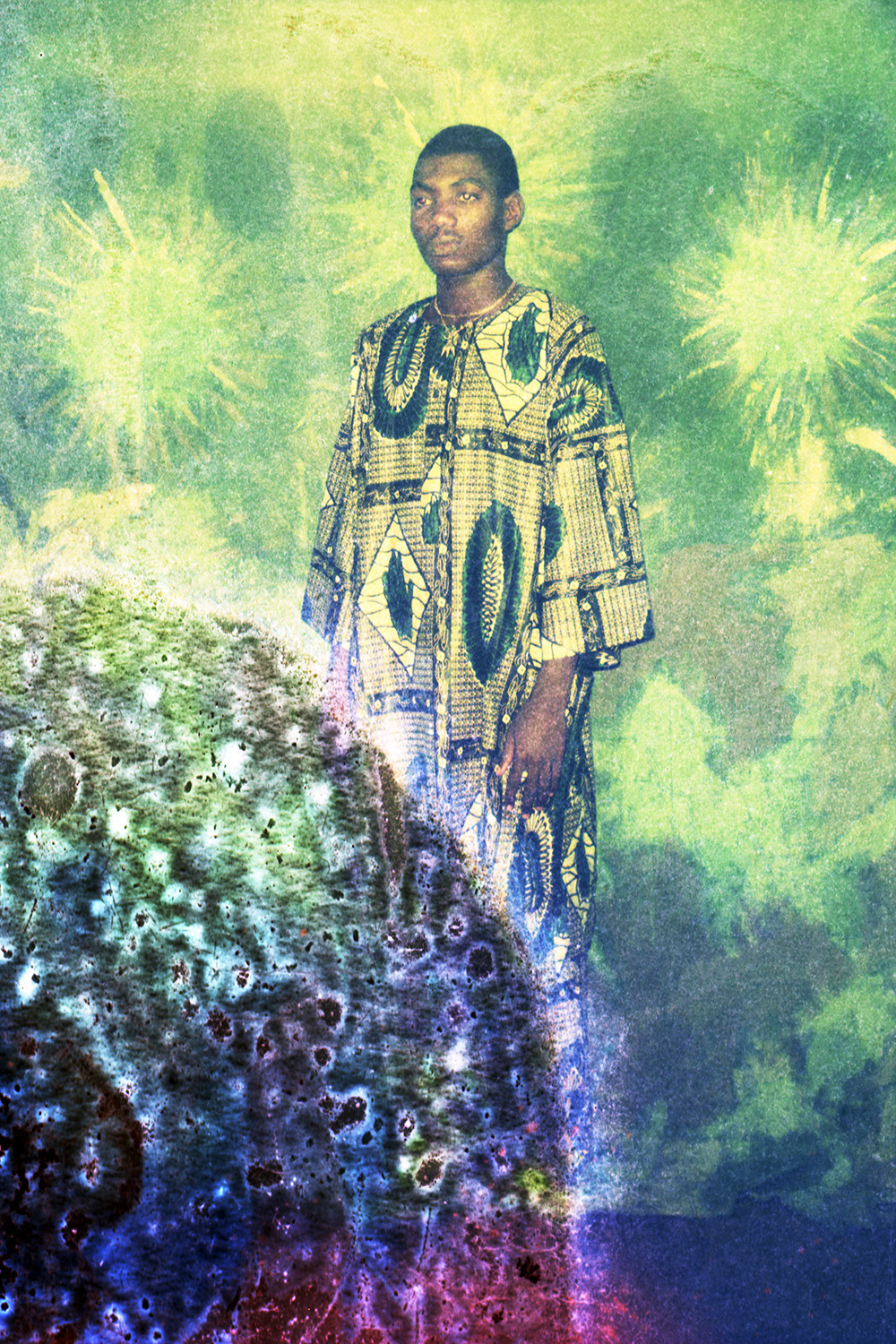
Over the road in the SLG’s second building, a former fire station, there are three more floors of works, my favourite being a delicious dis-location – or potent co-location – being enacted in Adeyemi Michael’s film Entitled (2018). An elaborately dressed Nigerian woman rides down Peckham’s Rye Lane, on a beautiful black horse. She must be the first woman to ride down the local high street on horseback in over 100 years – surely the first black woman ever.
She parades serenely past the colourful, graffiti-strewn shop shutters, the chaotic jumble of produce and signages. It’s a glorious image. Apparently, the rider is the artist’s mother in her ceremonial Yoruba attire, and she rides she intones snippets of how she has made her home here, including triumphs and contributions to the community.
I loved this work on first viewing. On second viewing, I liked it more, as I noticed the looks on peoples’ faces as she passes by – delight, amusement, awe. In the gallery, Michael has recreated her own living room. Two armchairs, a table filled with refreshments, and an assortment of glamorous accessories, help the viewer make themselves at home.
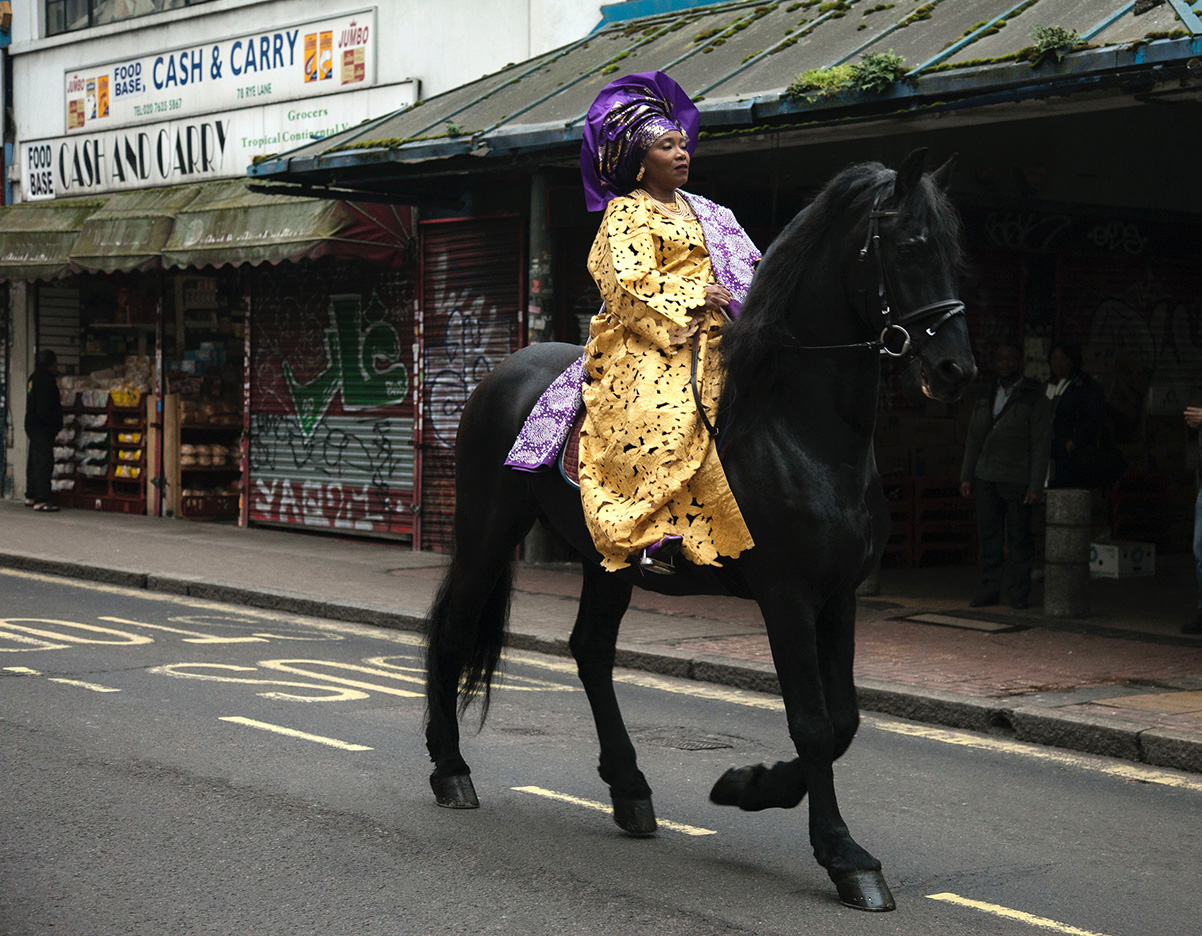

The power of her presence in this tableau contrasts nicely with the absences in the film showing in the adjacent room. Onyeka Igwe’s No Archive Can Restore You (2020) is a poignant work, shot in the now abandoned and near derelict building of the Nigerian Film Unit – one of the first outposts of the Colonial Film Unit, part of the British Government’s colonial education and propaganda programme. Abandoned since independence, the rooms are filled with dust, cobwebs, clumps of plaster, rusting pipes and – most hauntingly – stacks upon stacks of dusty film reels. The crackly soundtrack offers snippets from the archive.
There is a lovely scope and breadth of work, exploring connection and disconnection, emotional, cultural, social, and geographic. There is much in it that I recognise as someone who lived in Peckham for 25 years, as well as insights and new perceptions. And there is much in here for Peckham’s Nigerian diaspora, as evidenced on both my visits, by the crowds of visitors more diverse than in most London galleries, especially on the Family Day I happened across, featuring Nigerian music and art workshops. The place was jumping, full of sound and conversation – it felt like a gallery takeover, equal parts Lagos and Peckham.
It’s so fashionable right now for galleries to be ticking boxes with all the right issues – gender and race equality, planetary crisis – and often much of it feels tokenistic, no doubt likely to be swept aside when the next issue becomes hotter. But Lagos, Peckham, Repeat speaks with confidence about its locality, thanks to decades long investments in community education and engagement – and the South London Gallery has sacrificed none of its reputation for showcasing cutting edge art in the process.
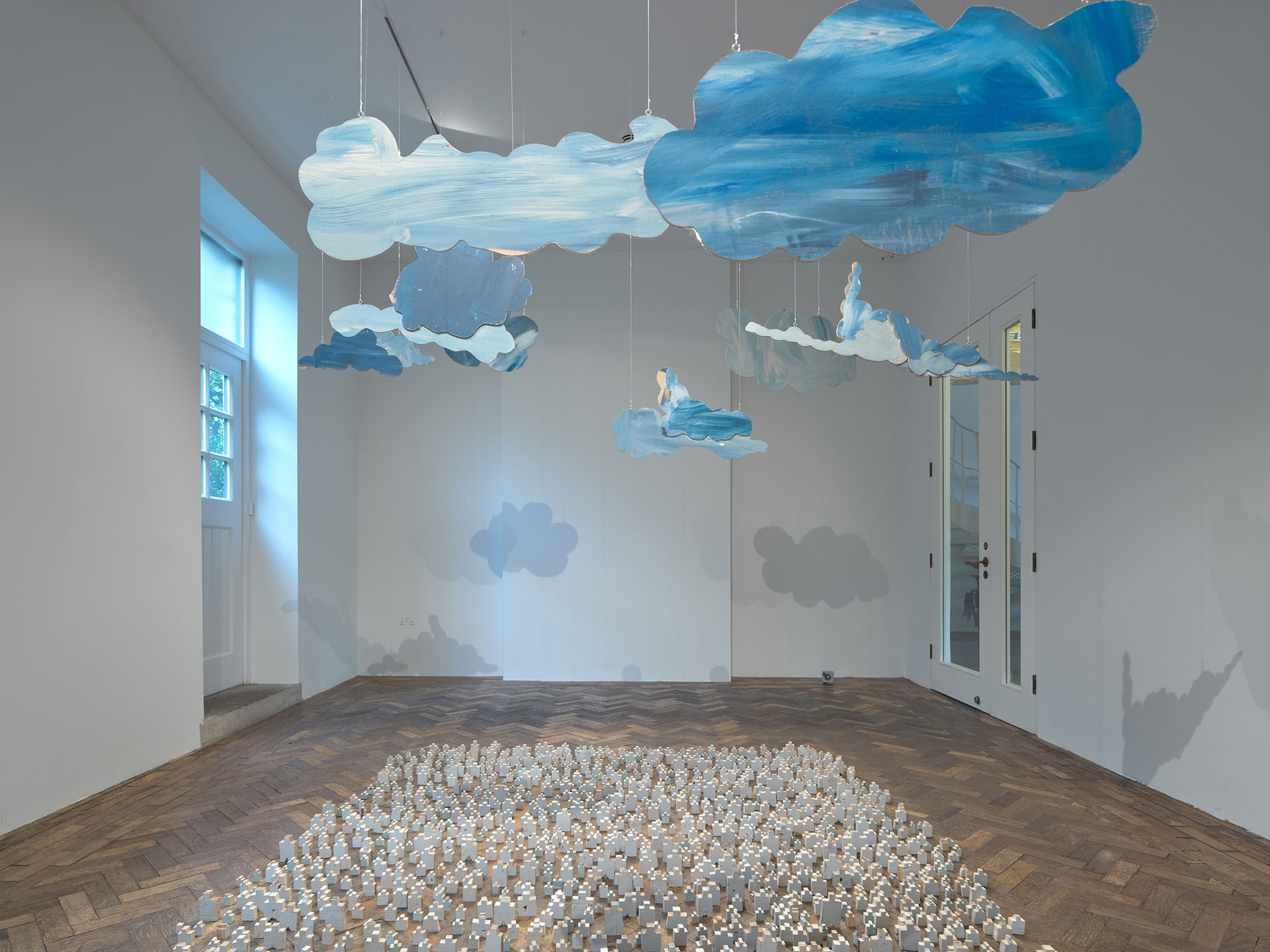

Veronica Simpson
has spent the last three decades observing the most interesting evolutions in design, architecture & art, for both consumer & specialist magazines, including Sunday Times Style, Blueprint, Damn and Studio International. Informed by an MSc in Environmental Psychology (2009-10, University of Surrey), her writing aims to place these creative disciplines in context as they relate to human needs or changing social & cultural values. With the current planetary & economic crises in mind, her writings prioritise the artists, designers & architects whose work best articulates the critical issues & ideally offers enlightened responses.
visit
Lagos, Peckham, Repeat: Pilgrimage to the Lakes continues at the South London Gallery until 29 October, free to visit. Further information available at:
www.southlondongallery.org/exhibitions/lagos-peckham-repeat
images
All images of Lagos, Peckham, Repeat: Pilgrimage to the Lakes at the South London Gallery. Courtesy &
©
the South London Gallery.
publication date
31 August 2023
tags
Africa, Colonial Film Unit, Diaspora, Ndidi Dike, Victor Ehikhamenor, William Hogarth, Onyeka Igwe, Lagos, Lagos Biennial, London, Markets, Adeyemi Michael, Nigeria, Nigerian Film Unit, Emeka Ogboh, Folakunie Oshun, Peckham, Religion, Yinka Shonibare, Veronica Simpson, South London Gallery, Spirituality, Yoruba people, Unilever
www.southlondongallery.org/exhibitions/lagos-peckham-repeat


